20 May, 2000
Fahrenheit to Celsius
DRAFT
May 20, 2000
Daily Data:
Around 11:00 PM the air temperature reading was 39.0 degrees Fahrenheit
taken from the USCGC Healy docked in St. John's. What is this temperature
reading in degrees Celsius?
USCGC Healy Facts
From the USCGC Healy (WAGB-20) brochure:
"The science community provided invaluable input on lab lay-outs and science
capabilities during design and construction of the ship. At a time when
scientific interest in the Arctic Ocean basin is intensifying, HEALY
enhances U.S. Arctic research capabilities substantially.
As a Coast Guard cutter, HEALY is also a capable platform for supporting
other potential missions in the polar regions, including logistics, search
and rescue, ship escort, environmental protections, and enforcement of laws
and treaties."
Dear Everyone,
As the locals say, if you don't like the weather in St. Johns, wait 5
minutes. It will change. Aside from some fog and chilling winds on my
Signal Hill hike to Cabot Tower, we have been fortunate to have plenty of
sunshine. In town, the daffodils and tulips are blooming and we are
reminded of springtime. Compared to our Arctic Healy experiences, it feels
beautifully warm to us. Once the sun sets, the temperature quickly drops.
How is temperature in degrees Fahrenheit translated to degrees Celsius? I
asked Robert Wolfe, a Research and Development Officer, from Ottawa,
Ontario, Canada this question. Robert supplied me with the following
information: "Enter this table with temperature Fahrenheit, F; Celsius
(centigrade), C; or Kelvin, K; and take out the corresponding readings on
the other two temperature scales.
On the Fahrenheit scale, the freezing temperature of pure water at standard
sea level pressure is 32 deg, and the boiling point under the same
conditions is 212 deg. The corresponding temperatures are 0 deg and 100 deg
on the Celsius scale and 273.15 deg and 373.15 deg, respectively, on the
Kelvin scale. The value of (-) 273.15 deg C for absolute zero, the starting
point of the Kelvin scale, is the value recognized officially by the
National Institute of Standards and Technology (NIST).
The formulas are:
C = 5/9 (F - 32 deg) = K - 273.15 deg
F = 9/5 (C + 32 deg = 9/5 K - 459.67 deg
K = 9/5 (F + 459.67 deg) = C + 273.15 deg
Compare the air temperature where you live with our air temperature in St.
John's, Newfoundland, Canada in both degrees Fahrenheit and Celsius. Then
compare it to the air temperature we experienced on the Healy in my journal
of May 13, 2000 "Saturday Notes".
Data on ice core 11A of April 19, 2000 follows.
Best regards,
Sandra Kolb
Core 11A level ice first testing floe
19-April-00 Total length 41 cm
decimal degrees degrees minutes
Latitude 64 04 62
Longitude 61 29 59
Brine volume for -2>T>-22.9
Brine volume coefficients:
F1(T) COEF. -4.732 -22.4500 -0.640 -0.011
F2(T) COEF. 8.90E-02 -0.01800 -0.001 0.000
Comments: Time 1322 GMT, White band at 4-5cm, diameters are irregular
depth cm temp C salinity weight g
05 -2.7 8.9 250.60
15 -2.5 6.1 305.02
25 -2.2 4.4 337.02
35 -1.9 6.1 352.24
length mm diameter mm density
76.15 69.05 0.879
89.72 69.15 0.905
97.2 69.4 0.917
99.4 70.3 0.913
RHOI bine vol air vol
0.9174 0.1521 0.06226
0.9174 0.1161 0.02828
0.9173 0.0968 0.01290
0.9173 0.1561 0.02352
porosity strength mpa strength psi
0.2143 0.178 25.8
0.1444 0.237 34.4
0.1097 0.283 41.0
0.1796 0.172 25.0
average brine vol 0.1216
average strength mpa 0.226
average strength psi 32.8
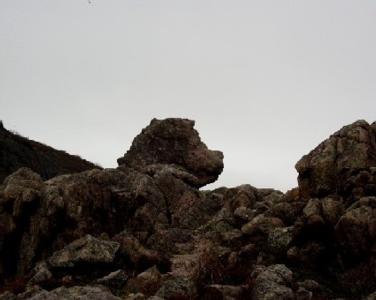
Rock formation on Signal Hill. Can you see a profile of a dog's face? photo by Sandra
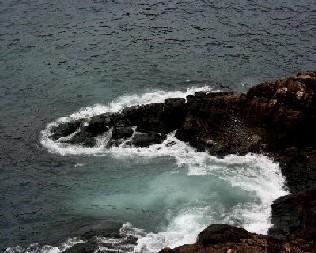
View from Signal Hill. photo by Sandra
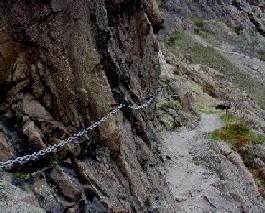
Pathway up Signal Hill to Cabot Tower. photo by Sandra
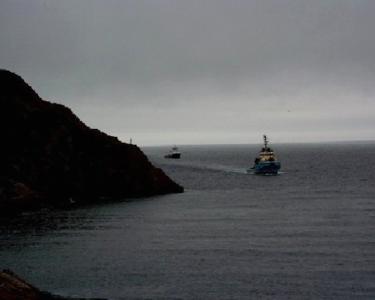
View of from pathway going up Signal Hill. photo by Sandra
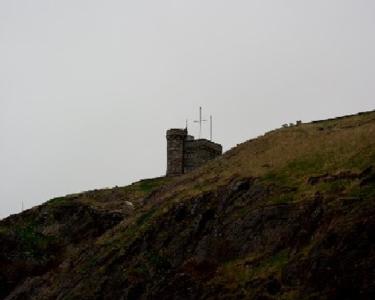
Cabot Tower on Signal Hill, St. John's. photo by Sandra
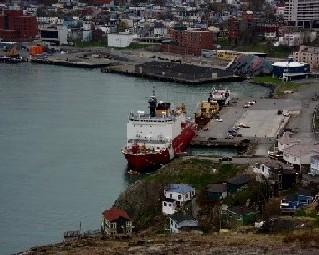
The USCGC Healy as seen from Signal Hill. photo by Sandra
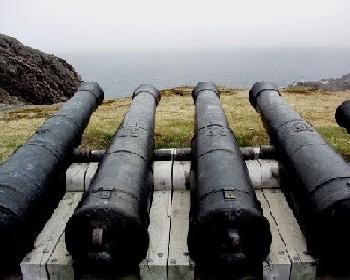
Fortification at Signal Hill. photo by Sandra
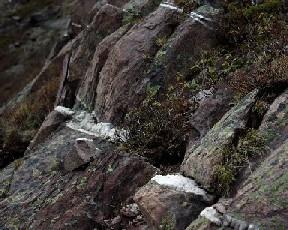
Along the pathway at Signal Hill. photo by Sandra
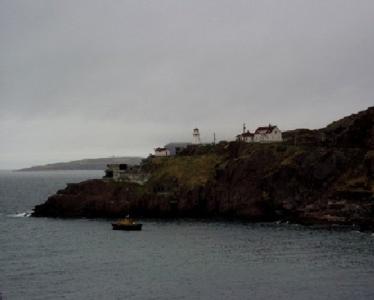
The lighthouse as seen from Signal Hill. photo by Sandra
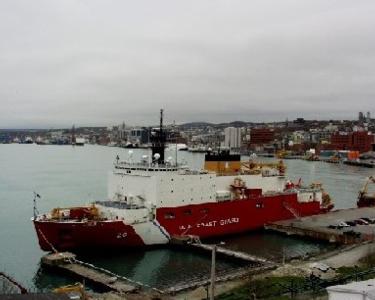
The USCGC Healy docked at pier 17 in St. John's, Newfoundland, Canada.
Contact the TEA in the field at
.
If you cannot connect through your browser, copy the
TEA's e-mail address in the "To:" line of
your favorite e-mail package.
|
